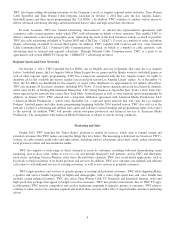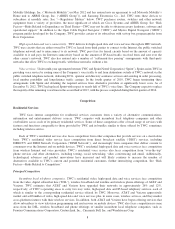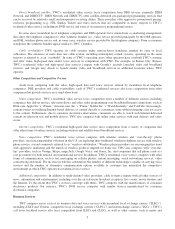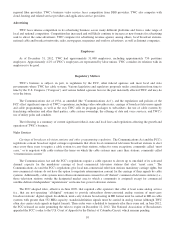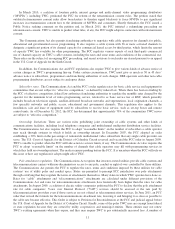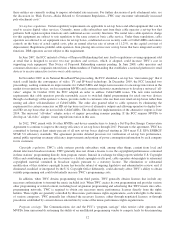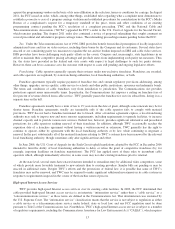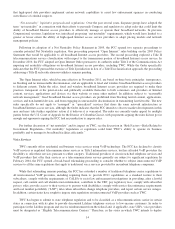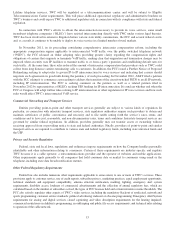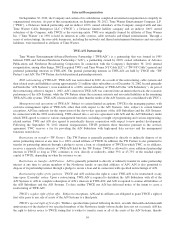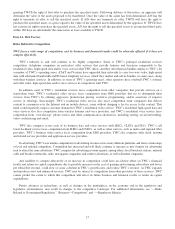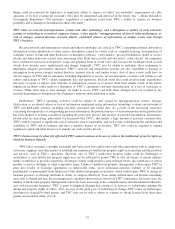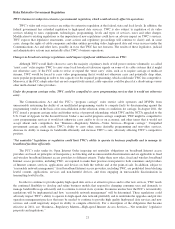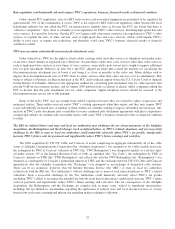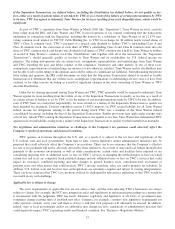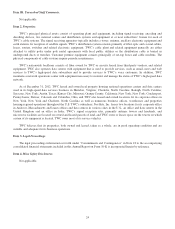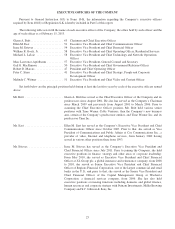Time Warner Cable 2012 Annual Report Download - page 25
Download and view the complete annual report
Please find page 25 of the 2012 Time Warner Cable annual report below. You can navigate through the pages in the report by either clicking on the pages listed below, or by using the keyword search tool below to find specific information within the annual report.Lifeline telephone services, TWC will be regulated as a telecommunications carrier and will be subject to Eligible
Telecommunications Carrier requirements. This will place additional operational, regulatory and administrative burdens on
TWC’s business and could expose TWC to additional regulatory risk in connection with its compliance with state and federal
regulation.
In connection with TWC’s efforts to obtain the interconnection necessary to provide its voice services, some small
incumbent telephone companies (“RLECs”) have resisted interconnecting directly with TWC under various legal theories.
TWC has been involved in extensive litigation before various state utility commissions, the FCC and several federal courts
and, as a result, it continues to be unable to deploy its voice service in a limited number of rural markets.
In November 2011, in its proceeding considering comprehensive intercarrier compensation reform, including the
appropriate compensation regime applicable to interconnected VoIP traffic over the public switched telephone network
(“PSTN”), the FCC released an Order adopting rules providing greater clarity regarding the compensation rights and
obligations of carriers that originate or terminate VoIP traffic, making clear that origination and termination charges may be
imposed when an entity uses IP facilities to transmit traffic to or from a party’s premises and establishing default rates for
such traffic. At the same time, these rules reduced the amount of intercarrier compensation that providers such as TWC could
collect from long distance carriers terminating calls to customers. In addition, the FCC issued a Further Notice of Proposed
Rulemaking seeking to adopt rules to govern IP-to-IP interconnection for voice services and indicating that carriers should
negotiate such agreements in good faith during the pendency of such proceeding. In November 2012, AT&T filed a petition
with the FCC asking it to commence a proceeding to address the transition of the circuit-switched PSTN to an all IP network,
including IP interconnection. The FCC is seeking comment on the petition as well as a related petition filed in
November 2012 by representatives of RLECs seeking USF funding for IP interconnection. It is unclear whether and when the
FCC or Congress will adopt further rules relating to IP interconnection or other regulation for IP voice services and how such
rules would affect TWC’s interconnected VoIP service.
Commercial Networking and Transport Services
Entities providing point-to-point and other transport services generally are subject to various kinds of regulation. In
particular, in connection with intrastate transport services, state regulatory authorities require such providers to obtain and
maintain certificates of public convenience and necessity and to file tariffs setting forth the service’s rates, terms, and
conditions and to have just, reasonable, and non-discriminatory rates, terms and conditions. Interstate transport services are
governed by similar federal regulations. In addition, providers generally may not transfer assets or ownership without
receiving approval from or providing notice to state and federal authorities. Finally, providers of point-to-point and similar
transport services are required to contribute to various state and federal regulatory funds, including state universal funds and
the USF.
Privacy and Security Regulation
Federal, state and local laws, regulations and ordinances impose requirements on how the Company handles personally
identifiable and other information relating to consumers. Certain of these requirements are industry specific and regulate
TWC because it is a cable operator, a telecommunications provider and the operator of websites and mobile applications.
Other requirements apply generally to all companies that hold consumer data or market to consumers using email or the
telephone, including state data breach notification statutes.
Other Federal Regulatory Requirements
Federal law also includes numerous other requirements applicable to some extent, to one or more of TWC’s services. These
provisions apply to customer service, use of credit reports, subscriber privacy, marketing practices, equal employment opportunity,
technical standards and equipment compatibility, antenna structure notification, marking, lighting, emergency alert system
requirements, disability access, loudness of commercial advertisements and the collection of annual regulatory fees, which are
calculated based on the number of subscribers served, the types of FCC licenses held and certain interstate revenue thresholds. The
FCC also actively regulates other aspects of TWC’s video services, including the mandatory blackout of syndicated, network and
sports programming; customer service standards; political advertising; indecent or obscene programming; Emergency Alert System
requirements for analog and digital services; closed captioning and video description requirements for the hearing impaired;
commercial restrictions on children’s programming; recordkeeping and public file access requirements; and technical rules relating
to operation of the cable network.
15



